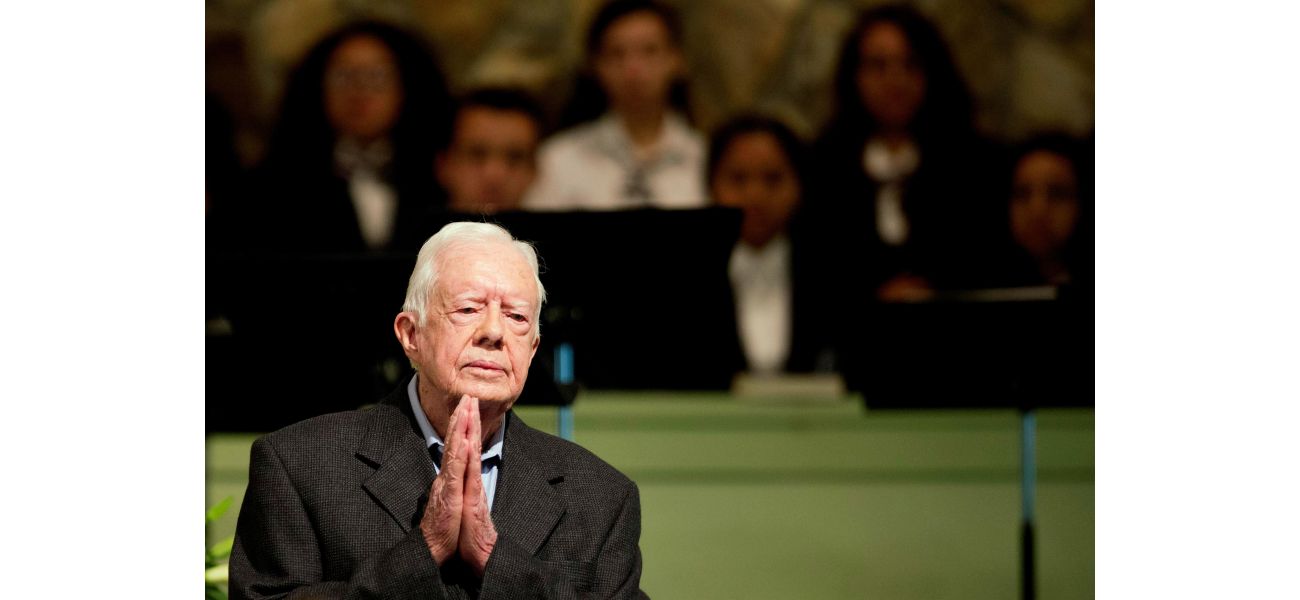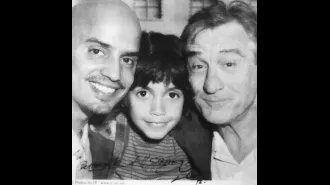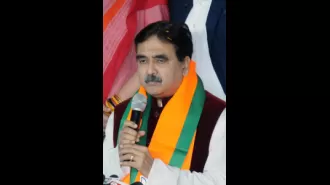The funeral of Jimmy Carter starts by tracing his journey from rural Georgia to the global spotlight in 100 years.
Jimmy Carter's farewell began in his hometown of Plains, GA, where his casket was transported past his childhood home before heading to Atlanta for his political and humanitarian legacy.
January 4th 2025.

On a somber Saturday in Georgia, Jimmy Carter's extended public farewell began. The 39th U.S. president, who passed away at the remarkable age of 100, was honored with a state funeral that would span six days and pay tribute to his life and legacy.
As the flag-draped casket made its way through the streets of Atlanta, it traced Carter's journey from humble beginnings in the Depression-era South to the highest office in the country and his decades-long dedication to humanitarian efforts worldwide. It was a poignant reminder of the remarkable man he was and the impact he had on the world.
The ceremony at The Carter Center, where family, friends, and colleagues gathered to honor the former president, was filled with personal anecdotes and heartfelt tributes. Carter's son, James Earl "Chip" Carter III, spoke of his father's unwavering determination and the unwavering support of his amazing wife, Rosalynn Carter, who had passed away in 2023. He also acknowledged the incredible impact his parents had on the world, and how privileged he was to have witnessed it firsthand.
Another tribute came from Carter's grandson, Jason Carter, who now chairs the center's governing board. He marveled at all that his grandfather had accomplished in his 100 years of life and how he had used it to make a positive impact on the world. It was a testament to Carter's unwavering commitment to public health, democracy, and human rights, which he continued to champion even after leaving the White House.
The ceremony was attended by Carter's children, grandchildren, and great-grandchildren, who accompanied his hearse as it made its way through his hometown of Plains, Georgia. The small town, with a population of only 700, had not changed much since Carter was born there in 1924. The procession stopped at the farm where the future president had worked alongside Black sharecroppers, and then continued to Atlanta, where Carter had served as a state senator and governor before becoming president.
The final stop for the day was at the Carter Presidential Center, which housed his presidential library and The Carter Center, where he dedicated his post-White House years to advocating for important causes. Jason Carter acknowledged the significance of the center and its role in continuing his grandfather's legacy.
As the ceremony came to an end, pallbearers from the Secret Service and military honor guard paid their respects to the former president, who was also a devout Baptist. The Rev. Tony Lowden, Carter's longtime personal pastor, shared a touching tribute to the man he had known, not as a president, but as a frail and humble man who had spent his final months in hospice care.
Chip Carter also shared touching memories of his father, who was not only a president but also a devoted father. He spoke of the special bond they shared, and how his father had gone above and beyond to help him succeed, even spending an entire Christmas break teaching him Latin so he could pass an exam.
The public was given the opportunity to pay their respects to the former president as his casket lay in repose at the Carter Presidential Center for three days. The national funeral procession would then continue in Washington, D.C., and conclude with a funeral at the Washington National Cathedral before returning to Plains for his final resting place.
The Carters had spent almost their entire lives in Plains, with the exception of his service in the Navy, four years in the Governor's Mansion, and four years in the White House. As the hearse made its way through the small town, mourners lined the streets, holding flowers and wearing pins bearing Carter's image. For 12-year-old Will Porter Shelbrock, who was born long after Carter's presidency, it was important to pay his respects to a man who had been ahead of his time in his efforts to make a positive impact on the world.
Willie Browner, who grew up in a nearby town, shared his admiration for Carter and how he had always thought of others before himself. Calvin Smyre, a former Georgia legislator, also spoke of Carter's legacy and how his repudiation of racial segregation had allowed people of color to have a voice in Georgia politics.
The procession passed by significant places in Carter's life, from the family peanut warehouse to the simple home where his mother, a nurse, had given birth to his wife, Rosalynn. The train depot that had served as his presidential campaign headquarters also brought back memories of his humble campaign, which was in stark contrast to the expensive and elaborate campaigns of today.
At the Carter farm, where he had grown up during the Great Depression, the National Park Service rangers paid their respects. The old farm bell rang 39 times in honor of the 39th president. It was a reminder of the blend of privilege and hard work that had defined Carter's upbringing and had shaped him into the remarkable man he was.
Carter's formative years on the farm had greatly influenced his policies and work in government and human rights. His dedication to advocating for those in need, regardless of their race, was a testament to his values and beliefs. As the nation said its final goodbyes to the former president, it was clear that his legacy would live on in the hearts and minds of those who had known him and those who had been inspired by his remarkable life.
As the flag-draped casket made its way through the streets of Atlanta, it traced Carter's journey from humble beginnings in the Depression-era South to the highest office in the country and his decades-long dedication to humanitarian efforts worldwide. It was a poignant reminder of the remarkable man he was and the impact he had on the world.
The ceremony at The Carter Center, where family, friends, and colleagues gathered to honor the former president, was filled with personal anecdotes and heartfelt tributes. Carter's son, James Earl "Chip" Carter III, spoke of his father's unwavering determination and the unwavering support of his amazing wife, Rosalynn Carter, who had passed away in 2023. He also acknowledged the incredible impact his parents had on the world, and how privileged he was to have witnessed it firsthand.
Another tribute came from Carter's grandson, Jason Carter, who now chairs the center's governing board. He marveled at all that his grandfather had accomplished in his 100 years of life and how he had used it to make a positive impact on the world. It was a testament to Carter's unwavering commitment to public health, democracy, and human rights, which he continued to champion even after leaving the White House.
The ceremony was attended by Carter's children, grandchildren, and great-grandchildren, who accompanied his hearse as it made its way through his hometown of Plains, Georgia. The small town, with a population of only 700, had not changed much since Carter was born there in 1924. The procession stopped at the farm where the future president had worked alongside Black sharecroppers, and then continued to Atlanta, where Carter had served as a state senator and governor before becoming president.
The final stop for the day was at the Carter Presidential Center, which housed his presidential library and The Carter Center, where he dedicated his post-White House years to advocating for important causes. Jason Carter acknowledged the significance of the center and its role in continuing his grandfather's legacy.
As the ceremony came to an end, pallbearers from the Secret Service and military honor guard paid their respects to the former president, who was also a devout Baptist. The Rev. Tony Lowden, Carter's longtime personal pastor, shared a touching tribute to the man he had known, not as a president, but as a frail and humble man who had spent his final months in hospice care.
Chip Carter also shared touching memories of his father, who was not only a president but also a devoted father. He spoke of the special bond they shared, and how his father had gone above and beyond to help him succeed, even spending an entire Christmas break teaching him Latin so he could pass an exam.
The public was given the opportunity to pay their respects to the former president as his casket lay in repose at the Carter Presidential Center for three days. The national funeral procession would then continue in Washington, D.C., and conclude with a funeral at the Washington National Cathedral before returning to Plains for his final resting place.
The Carters had spent almost their entire lives in Plains, with the exception of his service in the Navy, four years in the Governor's Mansion, and four years in the White House. As the hearse made its way through the small town, mourners lined the streets, holding flowers and wearing pins bearing Carter's image. For 12-year-old Will Porter Shelbrock, who was born long after Carter's presidency, it was important to pay his respects to a man who had been ahead of his time in his efforts to make a positive impact on the world.
Willie Browner, who grew up in a nearby town, shared his admiration for Carter and how he had always thought of others before himself. Calvin Smyre, a former Georgia legislator, also spoke of Carter's legacy and how his repudiation of racial segregation had allowed people of color to have a voice in Georgia politics.
The procession passed by significant places in Carter's life, from the family peanut warehouse to the simple home where his mother, a nurse, had given birth to his wife, Rosalynn. The train depot that had served as his presidential campaign headquarters also brought back memories of his humble campaign, which was in stark contrast to the expensive and elaborate campaigns of today.
At the Carter farm, where he had grown up during the Great Depression, the National Park Service rangers paid their respects. The old farm bell rang 39 times in honor of the 39th president. It was a reminder of the blend of privilege and hard work that had defined Carter's upbringing and had shaped him into the remarkable man he was.
Carter's formative years on the farm had greatly influenced his policies and work in government and human rights. His dedication to advocating for those in need, regardless of their race, was a testament to his values and beliefs. As the nation said its final goodbyes to the former president, it was clear that his legacy would live on in the hearts and minds of those who had known him and those who had been inspired by his remarkable life.
[This article has been trending online recently and has been generated with AI. Your feed is customized.]
[Generative AI is experimental.]
0
0
Submit Comment





